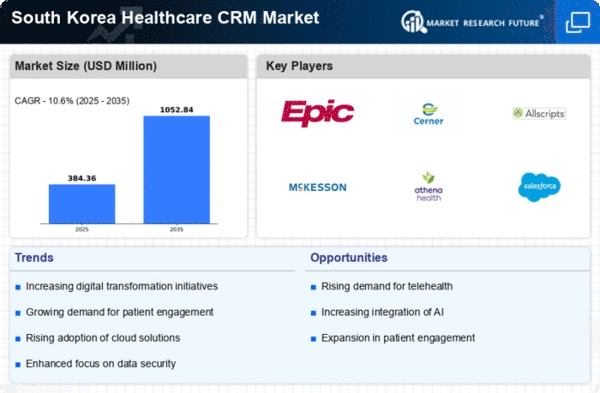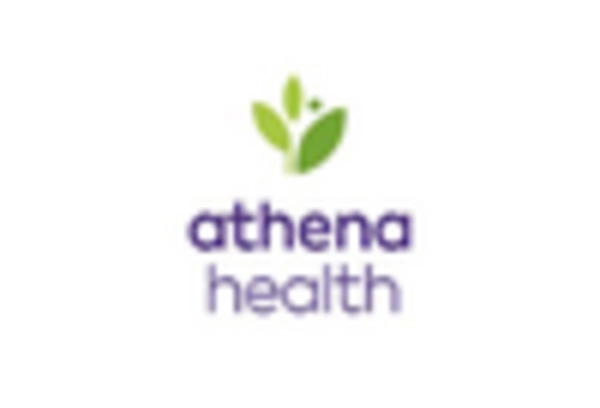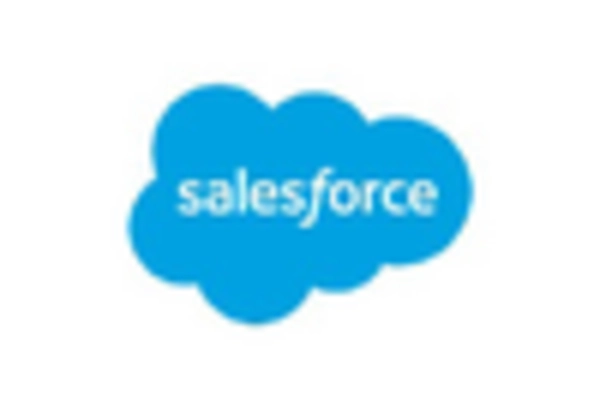Increased Focus on Data Analytics
The integration of data analytics into the healthcare crm market is becoming increasingly prominent in South Korea. Healthcare organizations are recognizing the value of data-driven decision-making, which is leading to the adoption of CRM systems that offer advanced analytics capabilities. By harnessing patient data, healthcare providers can gain insights into patient behavior, treatment outcomes, and operational efficiency. This trend is supported by the fact that approximately 70% of healthcare organizations in South Korea are investing in data analytics tools to enhance their CRM systems. The ability to analyze data effectively allows providers to tailor their services to meet patient needs, ultimately improving care quality and operational performance. As a result, the The market is likely to see a surge in demand for CRM solutions. that incorporate robust data analytics features.
Government Initiatives and Support
Government initiatives in South Korea are playing a crucial role in the expansion of the healthcare crm market. The South Korean government has been actively promoting digital transformation in the healthcare sector, which includes the implementation of advanced CRM systems. Policies aimed at enhancing healthcare delivery and efficiency are encouraging healthcare providers to adopt innovative technologies. For instance, the government has allocated substantial funding for digital health projects, which is expected to reach approximately $500 million by 2026. This financial support is likely to accelerate the adoption of healthcare CRM solutions, as organizations seek to comply with regulatory requirements and improve operational efficiency. Consequently, the The market is poised for growth as providers leverage government resources. to enhance their CRM capabilities and improve patient outcomes.
Emergence of Competitive Market Landscape
The healthcare crm market in South Korea is witnessing an emergence of a competitive landscape, characterized by the entry of various players offering innovative solutions. This competition is driving advancements in CRM technologies, as companies strive to differentiate their offerings. The presence of both established firms and startups is fostering an environment of innovation, leading to the development of specialized CRM solutions tailored to the unique needs of healthcare providers. Market analysis suggests that the number of CRM vendors in South Korea has increased by approximately 25% over the last two years. This growth indicates a robust interest in the healthcare crm market, as organizations seek to leverage diverse solutions to enhance patient management and operational efficiency. As competition intensifies, healthcare providers are likely to benefit from improved CRM offerings that cater to their specific requirements.
Growing Importance of Telehealth Services
The rise of telehealth services is significantly influencing the healthcare crm market in South Korea. As more patients seek remote healthcare options, healthcare providers are increasingly adopting CRM systems that facilitate telehealth services. These systems enable seamless communication between patients and providers, ensuring that care is accessible and efficient. Recent statistics indicate that telehealth usage has increased by over 40% in the past year, highlighting the need for CRM solutions that can support virtual consultations and remote patient monitoring. This shift towards telehealth is prompting healthcare organizations to invest in CRM technologies that enhance patient engagement and streamline care delivery. Consequently, the healthcare crm market is likely to expand as providers seek to integrate telehealth functionalities into their CRM systems.
Rising Demand for Patient-Centric Solutions
The healthcare crm market in South Korea is experiencing a notable shift towards patient-centric solutions. This trend is driven by an increasing emphasis on personalized care and improved patient engagement. Healthcare providers are recognizing the importance of understanding patient needs and preferences, which is leading to the adoption of CRM systems that facilitate better communication and relationship management. According to recent data, the market for patient engagement solutions is projected to grow at a CAGR of 15% over the next five years. This growth indicates a strong demand for healthcare CRM systems that can effectively manage patient interactions and enhance overall satisfaction. As a result, healthcare organizations are investing in CRM technologies that support personalized communication, appointment scheduling, and follow-up care, thereby transforming the patient experience in the healthcare crm market.

















